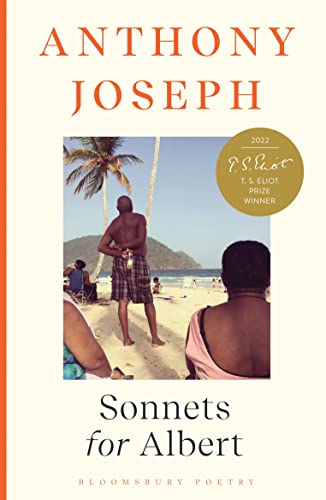Anthony Joseph "Sonnets For Albert" (Bloomsbury Poetry)

Sonnets for Albert is a poetry collection by Anthony Joseph which won the T.S. Eliot Prize for poetry in 2022. It is a deeply personal volume which explores Joseph’s ambivalent feelings towards his now-deceased father who was an absent figure throughout his life. The memories depicted make references to various elements of Caribbean life (Joseph was born in Trinidad) and utilise local dialect. Aside from being an academic and poet, Joseph is also a musician; his musicality is evident in the poem’s rhythms, which are influenced by Caribbean Calypso music.
Joseph has taken the sonnet form and adapted it to create a distinctly Caribbean sound and also to engage with a contemporary poetic freeness. Moreover, sonnets are traditionally love poems so it is interesting that Joseph’s attitude towards his father is not simply one of love, but also of bitterness, anger, admiration, and perplexity. The space of the poem serves as a forum in which he can decipher his own complex emotions towards this man who did not provide all he should have as a father but whose character was likeable and fascinating, perhaps all the more so because of the mystery which surrounded him as a result of its perpetual absence. I admire the honesty of Joseph’s approach which makes it much easier for others to relate to these poems and trust their speaker.
It is also clear that these poems are not just sonnets, but elegies, ways of understanding grief, loss and coming to terms with death. It is striking that Joseph chooses sonnets to describe his work rather than elegies. It occurs to me that, whilst elegies are a lament and therefore an immersion within sorrow and mourning, sonnets are a celebration of the human capacity for love against all odds, and are ultimately thereby an affirmation of life. I think that this is a much more positive approach to mourning. The fact that the poet is honest rather than putting his father on a pedestal, as was common for the subjects of both traditional sonnets and elegies.
Joseph’s focus on concrete memories throughout the collection enables him to generate a kind of scrapbook, a summary of a life. This creates a completeness of character and wholeness to pave a way forward out of an experience plagued with incompleteness and mystery – the sense that he did not really know his father because he wasn’t there enough.

Sonnets for Albert is a poetry collection by Anthony Joseph which won the T.S. Eliot Prize for poetry in 2022. It is a deeply personal volume which explores Joseph’s ambivalent feelings towards his now-deceased father who was an absent figure throughout his life. The memories depicted make references to various elements of Caribbean life (Joseph was born in Trinidad) and utilise local dialect. Aside from being an academic and poet, Joseph is also a musician; his musicality is evident in the poem’s rhythms, which are influenced by Caribbean Calypso music.
Joseph has taken the sonnet form and adapted it to create a distinctly Caribbean sound and also to engage with a contemporary poetic freeness. Moreover, sonnets are traditionally love poems so it is interesting that Joseph’s attitude towards his father is not simply one of love, but also of bitterness, anger, admiration, and perplexity. The space of the poem serves as a forum in which he can decipher his own complex emotions towards this man who did not provide all he should have as a father but whose character was likeable and fascinating, perhaps all the more so because of the mystery which surrounded him as a result of its perpetual absence. I admire the honesty of Joseph’s approach which makes it much easier for others to relate to these poems and trust their speaker.
It is also clear that these poems are not just sonnets, but elegies, ways of understanding grief, loss and coming to terms with death. It is striking that Joseph chooses sonnets to describe his work rather than elegies. It occurs to me that, whilst elegies are a lament and therefore an immersion within sorrow and mourning, sonnets are a celebration of the human capacity for love against all odds, and are ultimately thereby an affirmation of life. I think that this is a much more positive approach to mourning. The fact that the poet is honest rather than putting his father on a pedestal, as was common for the subjects of both traditional sonnets and elegies.
Joseph’s focus on concrete memories throughout the collection enables him to generate a kind of scrapbook, a summary of a life. This creates a completeness of character and wholeness to pave a way forward out of an experience plagued with incompleteness and mystery – the sense that he did not really know his father because he wasn’t there enough.
